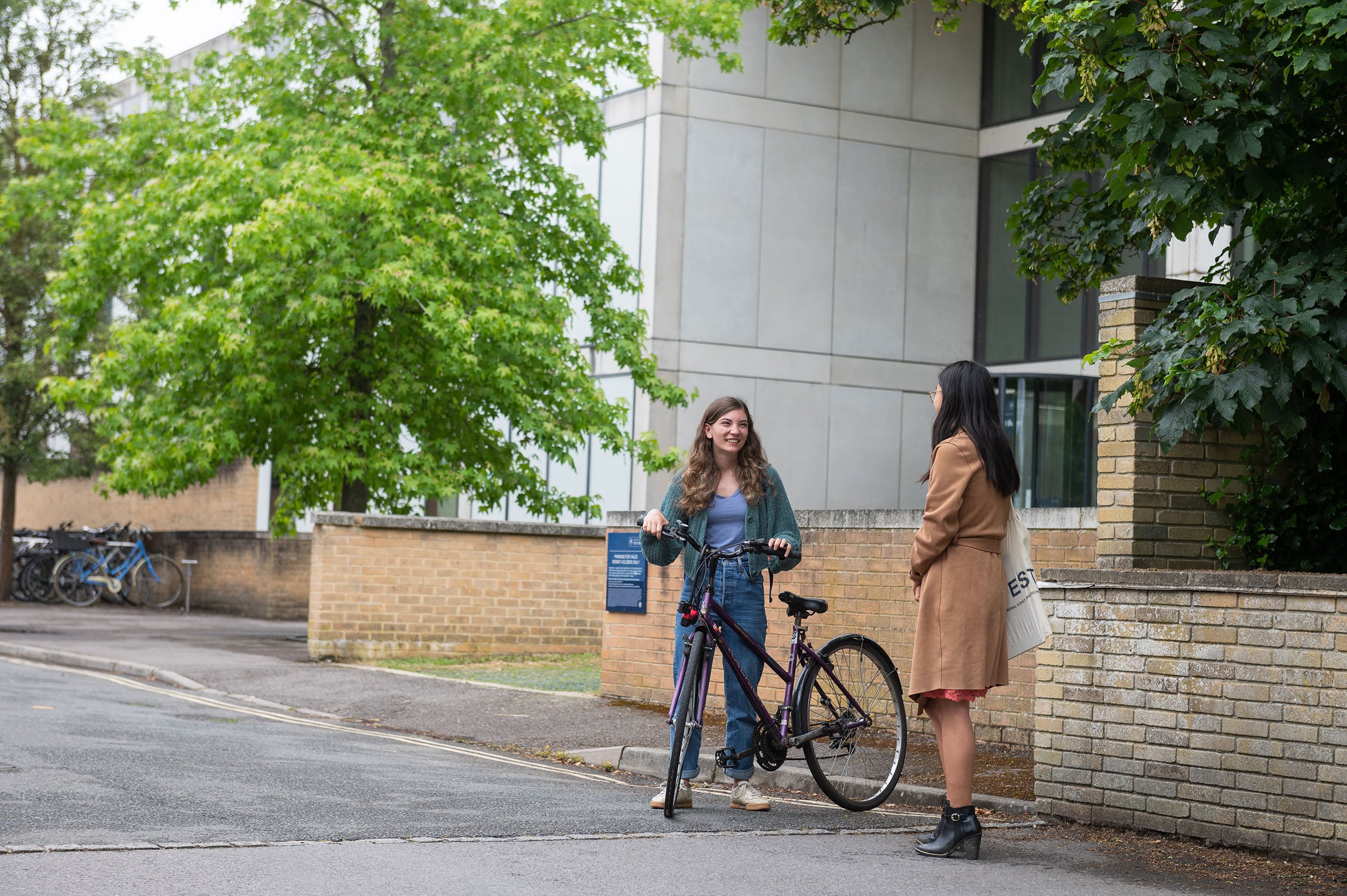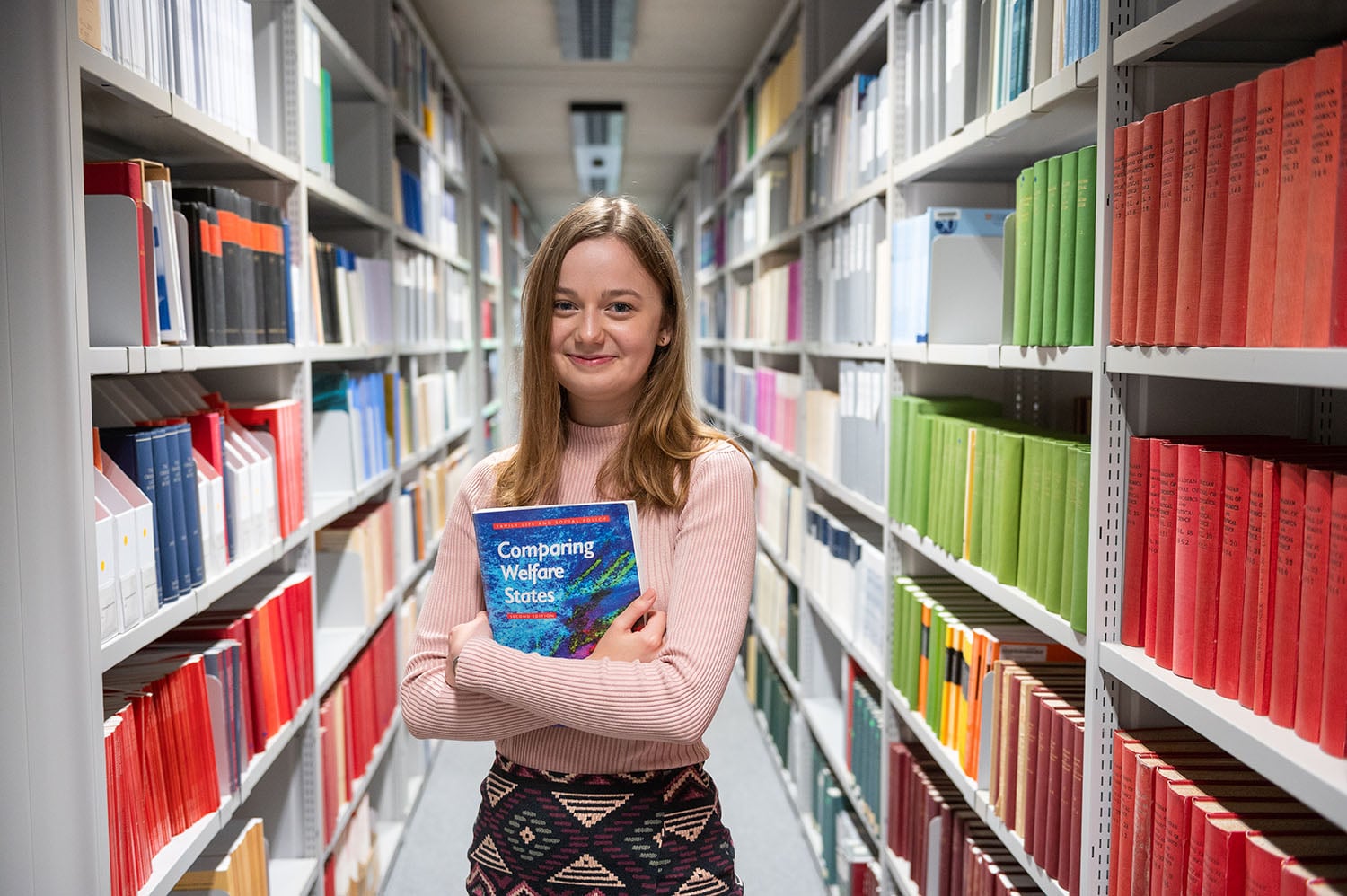
Philosophy, Politics and Economics
Course overview
UCAS code: L0v0
Entrance requirements: AAA
Course duration: 3 years (BA)
Subject requirements
Required subjects: Not applicable
Recommended subjects: Maths
Helpful subjects: History
Other course requirements
Admissions tests: TARA
Written Work: None
Admissions statistics*
Interviewed: 38%
Successful: 12%
Intake: 227
*3-year average 2023-25
Contact
Tel: +44 (0) 1865 288564
Email: [email protected]
Unistats information for this course can be found at the bottom of the page
Please note that there may be no data available if the number of course participants is very small.
About the course
Philosophy, Politics and Economics (PPE) arose from the belief that the advanced study of all three subjects would transform students’ intellectual lives, to great social benefit. This conviction remains as firm today as it was then. As the world has evolved, so has PPE. The course brings together some of the most important approaches to understanding the world around us, developing skills useful for a wide range of careers and activities.
PPE is a highly flexible degree which allows you to shape your own path through it. You may choose to specialise in two branches at the end of the first year, or continue with all three. You can also explore a wide variety of disciplines under the overarching headings of Philosophy, Politics and Economics. For example, you can specialise in Sociology or International Relations by choosing the relevant Politics options.
The three subjects each make a distinctively valuable contribution to the degree. Studying philosophy develops analytical, critical, and logical rigour – a highly transferable skill – through discussion of deep, puzzling questions such as 'what can we (really) know?' and 'why be moral?' that are fascinating in their own right.
In turn, the study of politics provides a thorough understanding of the impact of political institutions on modern societies. It helps you to evaluate the choices that political systems must regularly make, to explain the processes that maintain or change those systems, and to examine the concepts and values used in political analysis.
Economics is the study of how consumers, firms and government make decisions that collectively determine how resources are allocated. An appreciation of economics has become increasingly necessary to make sense of governmental policy-making, the conduct of businesses and the enormous economic transformations throughout the world.
All three branches of PPE at Oxford have an international reputation, supported by more than 200 renowned scholars.
Astrophoria Foundation Year
If you’re interested in studying PPE but your personal or educational circumstances have meant you are unlikely to achieve the grades typically required to make a competitive application for direct entry to PPE, then choosing to apply for PPE with a Foundation Year might be right for you.
Visit our Foundation Year course pages for more details.
 |  | |
'PPE this year has been a thoroughly enjoyable course. The three branches are perfect for a generalist like myself, and jumping from an economics problem set to a politics essay and then a logic exercise means you'll certainly never get bored. You'll have the opportunity to explore the perennial questions, of what's right and wrong, and how we ought to govern. You come to your own conclusions, and then pit your ideas against incredibly bright peers and expert tutors. I've had a great time so far.' Ren Ping | 'I enjoy PPE because it allows me to develop distinct lenses through which to engage with foundational questions about things that are entrenched in our common-sense understanding of the world. Why should I be moral? How do I know anything? How important is free speech? What happens if the banks close tomorrow? What does it mean to be efficient? Each discipline gives you different tools to examine the world as it is, and to think about how it should be. For example, Economics will allow you to quantify and model total welfare, whilst Philosophy will require you to question how welfare is defined in the first place and whether it can be aggregated at all. These diverse ways of knowing will sometimes reinforce and sometimes challenge each other, and that process is genuinely exciting.' Rhea |
Unistats information
Discover Uni course data provides applicants with Unistats statistics about undergraduate life at Oxford for a particular undergraduate course.
Please select 'see course data' to view the full Unistats data for PPE.
Please note that there may be no data available if the number of course participants is very small.
Visit the Studying at Oxford section of this page for a more general insight into what studying here is likely to be like.
Philosophy, Politics and Economics
A typical week
Your weekly timetable will usually include up to eight lectures and two tutorials and/or classes, supplemented by private study, which will be mainly spent preparing essays or problem sets for tutorials and classes.
Tutorials typically involve two to four students and a tutor. Class sizes may vary depending on the options you choose.
Teaching in all three PPE subjects is normally done in tutorials rather than classes. Where a class does form part of the teaching for a paper, it will typically include around six to ten students, although one computer-based training course in Politics may have up to 24 students in it.
Most tutorials, classes, and lectures are delivered by staff who are specialists in their subject. Many are world-leading experts with years of experience in teaching and research. Some teaching may also be delivered by postgraduate students, typically doctoral students who are also expert in the relevant field.
To find out more about how our teaching year is structured, visit our Academic Year page.
Course structure
Year 1
Indicative courses | Assessment |
|---|---|
All three branches of PPE are studied:
| First University examinations: three written papers |
Years 2 and 3
Indicative courses | Assessment |
|---|---|
Students choose to continue with all three branches (tripartite) or concentrate on any two (bipartite), taking compulsory courses in the chosen branches along with optional courses:
More information about each course is in the handbook on the course website. | Final University examinations: eight papers, typically assessed by written examination, but in some cases by coursework. One of these eight papers may be a thesis/supervised dissertation. |
Conditions of Progression
PPE Candidates must pass the First Public Examination (known as ‘prelims’ or ‘mods’), held in Trinity Term of their 1st year, in order to be admitted to the Final Honour School (years 2-3).
The content and format of this course may change in some circumstances. Read further information about potential course changes.
Academic requirements
Qualification | Requirement |
|---|---|
A-levels: | AAA |
Advanced Highers: | AA/AAB |
International Baccalaureate (IB): | 39 (including core points) with 766 at HL |
Any other equivalent qualification: | View information on other UK qualifications, and international qualifications. |
Wherever possible, your grades are considered in the context in which they have been achieved.
View further information on how we use contextual data.
Subject requirements
Recommended: | It is recommended for candidates to have studied Mathematics to A-level, Advanced Higher, Higher Level in the IB or another equivalent.* |
|---|---|
Helpful: | You may apply for PPE having done any combination of subjects at school; it is not necessary to have studied Politics, Philosophy or Economics. History can provide a useful background, but is not essential. |
* Although a background in Mathematics is not an essential requirement for admission, it is recommended. PPE applicants should have sufficient interest in, and aptitude for, mathematics to be comfortable articulating ideas in an equation as well as in a diagram or a written statement. Mathematics is a particular advantage for the Economics component of the course, as well as for the first year logic course in philosophy, and for the first year statistics course in politics. A large majority of successful applicants are studying Maths to A-level, or another equivalent.
You may like to consider taking Maths to AS-level, or an equivalent qualification such as IB Standard Level, even if you do not pursue it further. However, we do understand that these qualifications may not be available to all students. Extra tuition will be available to on course students who have not studied Maths A-Level who require any assistance. You can view the PPE admissions statistics for information on the success rates for applicants applying with different A-level subjects.
If a practical component forms part of any of your science A‐levels used to meet your offer, we expect you to pass it.
If English is not your first language you may also need to meet our English language requirements.
If your personal or educational circumstances have meant you are unlikely to achieve the grades required to make a competitive application for direct entry to PPE, but you still have a strong interest in the subject, then applying for PPE with a Foundation Year might be right for you.
Visit the Foundation Year course pages for more details of academic requirements and eligibility.
Admissions tests
| Test | TARA |
| Test date(s) | Test dates will be announced in April 2026. Oxford applicants must book a test for the October sitting. |
All candidates must take the TARA as part of their application.
All the information you need to arrange to take your test as well as how best to prepare can be found on the UAT-UK website.
Written work
You do not need to submit any written work when you apply for this course.
What are tutors looking for?
Admissions tutors will want to find out if you can think clearly and analytically. They are less concerned with what you know than with how you think and use your knowledge. They will seek evidence of interest in all three subjects.
Visit the PPE website for more detail on the selection criteria for this course.
Careers
Many PPE graduates go on to further academic study. Some careers that PPE graduates have gone on to pursue include:
- banking and finance
- politics
- journalism
- broadcasting and new media
- law
- political activism and campaigning
- teaching
- social work
- voluntary organisations and charities
- accountancy
- business management
- management consultancy
- advertising
- university teaching and research
- think tanks and consultancy
- work in international organisations
- and the many branches of public service.
Ella was managing director of Abel & Cole, the organic food retailer. She says:
'I first saw a video of the Amazon rainforest burning when I was at school in the early 1990s. From that moment, I urgently wanted to protect the natural world. I didn’t know how, though. PPE was invaluable in helping me understand how economic and political systems work, and how they drive such damage to nature. PPE also gave me confidence to evaluate solutions to these problems, and to articulate my responses. The degree gave me credibility when I was starting out, and it helped me navigate my way to a constructive career. I feel proud of what I achieved at Abel & Cole. I’m sorry to say that the Amazon is still burning, though, and that there is a great deal more work to be done.'
Rayan went on to pupillage at a leading barristers’ chambers in London. He says:
'PPE encouraged me, more than anything else, to think critically about the social world and our place in it. It taught me how to test and challenge arguments and disentangle their constituent parts. That experience has been crucial to my pursuing a career as a barrister. First, because the philosophical skills that I acquired have proven invaluable in thinking about, developing, and challenging legal arguments in practice. And second, because it's helped me to continuously reflect upon the social impact of the law and its relationship with political power.'
We don't want anyone who has the academic ability to get a place to study here to be held back by their financial circumstances. To meet that aim, Oxford offers one of the most generous financial support packages available for UK students and this may be supplemented by support from your college.
Fees
Please note that for full-time Home undergraduate students, current university policy is to charge fees at the level of the cap set by the government, which for 2026/27 is £9,790. For details of annual increases, please see our guidance on likely increases to fees and charges. In the 2027/28 academic year course fees for Home fee status students will rise to £10,050 (in line with the government fee cap).
Fee status | Annual Course fees |
| Home | £9,790 |
| Overseas | £43,600 |
Further details about fee status eligibility can be found on the fee status webpage.
For more information please refer to our course fees page. Fees will usually increase annually. For details, please see our guidance on likely increases to fees and charges.
Living costs
Living costs at Oxford might be less than you’d expect, as our world-class resources and college provision can help keep costs down.
Living costs for the academic year starting in 2026 are estimated to be between £1,405 and £2,105 for each month you are in Oxford. Our academic year is made up of three eight-week terms, so you would not usually need to be in Oxford for much more than six months of the year but may wish to budget over a nine-month period to ensure you also have sufficient funds during the holidays to meet essential costs. For further details please visit our living costs webpage.
Financial support
Home | A tuition fee loan is available from the UK government to cover course fees in full for Home (UK, Irish nationals and other eligible students with UK citizens' rights - see below*) students undertaking their first undergraduate degree**, so you don’t need to pay your course fees up front. In 2026 Oxford is offering one of the most generous bursary packages of any UK university to Home students with a family income of around £50,000 or less, with additional opportunities available to UK students from households with incomes of £32,500 or less. The UK government also provides living costs support to Home students from the UK and those with settled status who meet the residence requirements. *For courses starting on or after 1 August 2021, the UK government has confirmed that EU, other EEA, and Swiss Nationals will be eligible for student finance from the UK government if they have UK citizens’ rights (i.e. if they have pre-settled or settled status, or if they are an Irish citizen covered by the Common Travel Area arrangement). The support you can access from the government will depend on your residency status. |
Islands | Islands students are entitled to different support to that of students from the rest of the UK. Please refer the links below for information on the support to you available from your funding agency: |
Overseas | Please refer to the "Other Scholarships" section of our Oxford Bursaries and Scholarships page. |
**If you have studied at undergraduate level before and completed your course, you will be classed as an Equivalent or Lower Qualification student (ELQ) and won’t be eligible to receive government or Oxford funding
Additional Fees and Charges Information for Philosophy, Politics and Economics
There are no compulsory costs for this course beyond the fees shown above and your living costs.
Contextual information
Unistats course data from Discover Uni provides applicants with statistics about a particular undergraduate course at Oxford. For a more holistic insight into what studying here is likely to be like, please view the information below and explore our website more widely.
The Oxford tutorial
College tutorials are central to teaching at Oxford. Typically, they take place in your college and are led by your academic tutor(s) who teach as well as do their own research. Students will also receive teaching in a variety of other ways, depending on the course. This will include lectures and classes, and may include laboratory work and fieldwork. However, tutorials offer a level of personalised attention from academic experts unavailable at most universities.
During tutorials (normally lasting an hour), college subject tutors will give you and one or two tutorial partners feedback on prepared work and cover a topic in depth. The other student(s) in your tutorials will typically be doing the same course as you and covering the same topic. Such regular and rigorous academic discussion develops and facilitates learning in a way that isn’t possible through lectures alone. Tutorials also allow for close progress monitoring so tutors can quickly provide additional support if necessary.
Read more about tutorials and an Oxford education
College life
Our colleges are at the heart of Oxford’s reputation as one of the best universities in the world.
- At Oxford, everyone is a member of a college as well as their subject department(s) and the University. Students therefore have both the benefits of belonging to a large, renowned institution and to a small and friendly academic community. Each college or hall is made up of academic and support staff, and students. Colleges provide a safe, supportive environment leaving you free to focus on your studies, enjoy time with friends and make the most of the huge variety of opportunities.
- Each college has a unique character, but generally their facilities are similar. Each one, large or small, will have the following essential facilities:
- Porters’ lodge (a staffed entrance and reception)
- Dining hall
- Lending library (often open 24/7 in term time)
- Student accommodation
- Tutors’ teaching rooms
- Chapel and/or music rooms
- Laundry
- Green spaces
- Common room (known as the JCR).
- All first-year students are offered college accommodation either on the main site of their college or in a nearby college annexe. This means that your neighbours will also be ‘freshers’ and new to life at Oxford. This accommodation is guaranteed, so you don’t need to worry about finding somewhere to live after accepting a place here, all of this is organised for you before you arrive.
- All colleges offer at least one further year of accommodation and some offer it for the entire duration of your degree. You may choose to take up the option to live in your college for the whole of your time at Oxford, or you might decide to arrange your own accommodation after your first year – perhaps because you want to live with friends from other colleges.
- While college academic tutors primarily support your academic development, you can also ask their advice on other things. Lots of other college staff including welfare officers help students settle in and are available to offer guidance on practical or health matters. Current students also actively support students in earlier years, sometimes as part of a college ‘family’ or as peer supporters trained by the University’s Counselling Service.
Connect with us
Outreach programmes and events
Many academic departments and faculties at Oxford have dedicated outreach events and activities aimed at promoting their subject area(s) and supporting talented students from all backgrounds to apply to their courses.
University-wide events and resources
In addition to exploring department-run activities, we recommend checking out the outreach event calendar for upcoming University-wide events and other subject and college activities.
Subject-specific resources supporting supercurricular engagement for all ages can also be found via the University's Digital Resource Hub, suggested subject resources webpage and Oxplore, our online learning platform for 11-to-18-year-olds.
UK state school students interested in this or similar courses may like to explore UNIQ, Oxford's free flagship outreach programme for students in their first year of further education. UNIQ offers a choice of academic residentials in over 30 courses and each year provides around 1,500 students with the opportunity to experience Oxford's teaching, explore student life and receive expert support with their application to university.
Prospective applicants can sign up to receive step-by-step support with their Oxford application.
Read more about Oxford's widening access initiatives and other ways to connect with us before applying.

